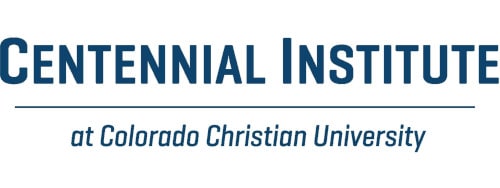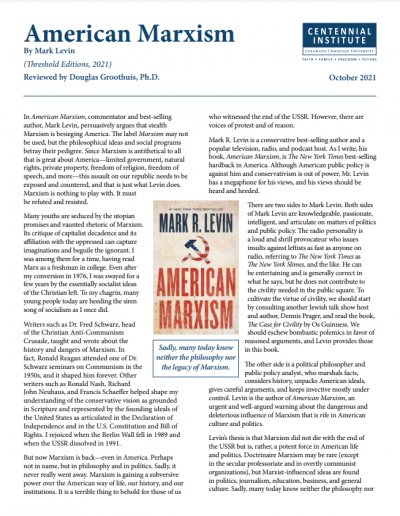Policy Briefs
As Colorado Christian University’s think tank, we draw on the expertise of CCU Faculty, Centennial Institute Fellows, and other skilled policy analysts and experts to provide background and recommendations on current issues facing policymakers in Colorado and the nation. We do not take sides on candidates, but rather focus on nonpartisan policy recommendations to better our state and nation.
Policy Brief No. * 2023-03-15 08:48:16
Christian Reflections on Christian Nationalism
By Mark David Hall
Abstract: It seems the phrase “Christian nationalism” has become a rallying cry or a scapegoat, depending on who you ask. Christians have always been called to engage in the public square; however, methodologies of engagement have been hotly debated since the founding of the United States. In this current political climate, what does it mean to be a “Christian nationalist”? Is this a title Christians should embrace? Or shy away from?
Policy Brief No. 2021-14-10 * 2021-10-14 10:12:03
American Marxism Book Review
By Dr. Douglas Groothuis
Abstract: Douglas Groothuis, Ph.D., is
the Fellow in Worldviews at the
Centennial Institute and Affiliate
Professor within the School of
Theology at Colorado Christian
University. He is the author or
editor of fifteen books, including
Christian Apologetics. His opinions
are his own and are not necessarily
those of the Centennial Institute or
Colorado Christian University
Policy Brief No. 2020-17-9 * 2020-09-17 11:01:55
America, Critical Theory, and Social Crisis
By Douglas Groothuis
Abstract: Douglas Groothuis, Ph.D., is Professor of Philosophy at Denver Seminary, where he directs the Apologetics and Ethics Master’s Degree. He is the author or editor of fifteen books, including Christian Apologetics. His opinions are his own and are not necessarily those of Denver Seminary.
Policy Brief No. November 18, 2018 * 2018-11-18 09:01:27
Economic and Social Costs of Legalized Marijuana
By QREM
Abstract: Research conducted by QREM, a third-party evaluation firm serving non-profits and many of Colorado’s most reputable foundations.
Policy Brief No. 2016-1 * 2016-08-24 06:02:53
Suicide By Doctor: What Colorado Would Risk on the Slippery Slope of Physician-Assisted Suicide
By Michael Norton and Natalie Decker
Abstract: Following the lead of five other states and several foreign countries, proponents in Colorado this year are seeking both legislation and a ballot initiative to allow a physician to assist with a patient’s suicide. If such a measure became law, it would invert the doctor’s time honored role from the sacred duty of sustaining life to the ghoulish power of terminating it. Centennial Institute asked two respected attorneys formerly with our sister organization Alliance Defending Freedom and now with the Colorado Freedom Institute, for a legal and ethical analysis of what is at stake as both the Colorado General Assembly and citizens of Colorado confront this issue. Here is their report.
Policy Brief No. 2014-4 * 2014-11-21 08:38:34
Our Unwelcoming Welcome Mat: The Case for Immigration Simplification
By Helen Raleigh
Abstract: No matter what comes of the showdown between the President and Congress over how to deal with the millions of foreigners illegally present in this country, two great questions will remain if the United States is to continue in global leadership: How can America live up to our self-understanding as a beacon of liberty and opportunity to the world? How can we counter falling birthrates to maintain a workforce that can drive the economic growth and tax revenues needed for our social contract between the generations? The answer: Only by offering an open door for the right people in the right numbers wishing to immigrate here. Finally, here's a practical plan for immigration simplification is based on the core American principles of equal treatment, rule of law, and self-reliance.
Policy Brief No. 2014-3 * 2014-08-25 09:10:38
The Big Deal: How Marijuana Endangers Young People and What Policymakers Should Do
By Christian Thurstone, MD
Abstract: When Coloradans in 2012 approved Amendment 64, a constitutional provision legalizing marijuana for optional (miscalled “recreational”) use by people 21 and older, they moved the state into uncharted waters for medical and social impacts from this high-potency chemical. The experiment set in motion new and very serious challenges to the protection of public health and safety – specifically that of children and youth. Here are the cold facts, medically documented, about those dangers, along with a six-point damage control agenda for policymakers. It all starts with the oft-invoked but in this case overlooked axiom: Put children first.
Policy Brief No. 2014-2 * 2014-04-07 15:56:13
Endangered R Us: Unintended Consequences of the Endangered Species Act, 1973-2013
By By Kent Holsinger
Abstract: Editor: The U.S. Endangered Species Act (ESA) is the world’s most powerful environmental law. Bureaucratically complex, beset with litigation, gamed by activists, the ESA’s mandate for species protection “whatever the cost” abounds with adverse unintended consequences. Americans have wakened to realize that under ESA some of our own cherished values such as private property and economic growth are as endangered as any bug, bird, mouse, or minnow. Energy resources, agricultural productivity, and access to public lands are hindered by ESA, with untold billions in costs. Colorado case studies of the Preble’s mouse and the greater sage grouse illustrate these impacts. Kent Holsinger, a leading authority on the intricacies and burdens of ESA, argues for rethinking the law’s operation from a cost-benefit standpoint. Practical solutions such as programmatic compliance and market-based mitigation offer an exit from endless expensive regulation at undetermined benefit.
Policy Brief No. Comparative Counties Study * 2014-03-20 15:59:37
GRASSROOTS GOVERNMENT IN COLORADO
By Centennial Institute Staff
Abstract: Editor: Following upon widespread discontent among rural Coloradans in 2013, leading to talk of secession and heightened interest in political decentralization, Weld County's board of commissioners engaged a Centennial Institute research team to compile and analyze comparative data on Weld's governance and public administration, economic and fiscal condition, and citizen attitudes, relative to those in five other Colorado counties similarly situated: Larimer, Boulder, El Paso, Pueblo, and Mesa. Findings and recommendations are spelled out in this 100-page study. Our charge was to give Weld commissioners an assessment of how well they are performing, why performance is good or not, what steps they might take to improve where needed, and whether their model may be transferable to other counties. The research team concluded that Weld County's performance of its governmental mission compares very favorably with peer counties on most objective measurements, and that Weld residents subjectively register more satisfaction with life in the county than Coloradans in other locales. As for transferability, the team judged the Weld model as one that "local governments everywhere would do well to replicate."
Policy Brief No. 2014-1 * 2014-03-12 16:03:49
The Hydraulic Fracturing Primer: Base Energy Regulation on Facts, not Fear
By Centennial Institute Staff
Abstract: Editor: Here is a factual counterweight to the waves of unfavorable media and advocacy stirring up fear about the process of extracting oil and gas from the ground through the method known as hydraulic fracturing or “fracking.” Waves of propaganda have fostered a broad negative perception of fracking. Voters in four Colorado cities have banned fracking as a result, with a statewide ban projected in 2014. To remedy the dearth of factual information reaching the public, this policy brief details the history, methods, and chemistry involved in fracking. There is authoritative information about the drilling, amounts and composition of water used, the depths of wells away from water tables, and the safeguards in place. The primer compiles solid evidence to help allay Americans’ widespread but utterly misplaced concerns about water and air pollution risks associated with hydraulic fracturing.
Policy Brief No. 2013-4 * 2013-12-16 16:06:04
Medical Direct Pay: How States Can Start Improving Health Care Right Now
By Frank D. Francone
Abstract: Editor: Despite gridlock on health care nationally, states can take one immediate step to address the cost and quality of care for everyone. Arizona showed the way when it passed an innovative medical “direct pay” law. Direct pay means that a patient pays the doctor or hospital directly. The provider need not claim reimbursement by a third party. The patient, if insured, is responsible for collection of reimbursement. The Arizona law fully legalizes direct pay and requires health care providers and facilities to make available to the public, their direct pay prices for their top 25 or 50 services. Anticipated benefits, in Arizona as the law took effect this year and in Colorado or other states that may follow suit next year, include placing downward pressure on medical prices, assisting those who become victims of the ACA (Obamacare) when their insurance is cancelled, and pointing the way beyond ACA to a better health care system in the future.
Policy Brief No. 2013-3 * 2013-10-01 16:09:42
Bad Bargain: How Renewable Energy Mandates Pick your Pocket
By Kelly Sloan
Abstract: Editor: The fading fad for state Renewable Portfolio Standards (RPS) has accomplished little but the transfer of vast sums of money from consumers to favored industries. Average electric rates in the 30 states with enforceable mandates for wind and solar are 21% higher than in the states without such mandates. Higher unemployment in a state appears to be correlated with higher electric rates, which in turn are often correlated with enforceable mandates. Between 2003 and 2012, residential electric rates rose nationally by 36%, half again as fast as the inflation rate at 24.8%, hurting poor people the most. Despite all the mandates, subsidies, tax breaks, and loan guarantees, wind and solar accounted for barely 4% of total U.S. electrical generation in 2012. Electricity generated by wind and solar will always cost more because of intermittent availability, geographic limitations, and impracticality of storage.
Policy Brief No. 2013-2 * 2013-04-10 16:14:30
You Want Affordable Care? Common Sense from a Practicing Physician
By Dr. Jill Q. Vecchio, MD
Abstract: Editor: The Patient Protection and Affordable Care Act, President Obama’s prescription for reforming American health care, could not be more misleadingly named. As the public is beginning to realize, with its full implementation now upon us, the PPACA law neither protects patients – who face rationing, shortages, and delays – nor guarantees affordable care. It only guarantees higher premiums, higher taxes, and worst of all, degradation of care for many in the most vulnerable groups – older people under Medicare and lower-income people under Medicaid. And now Colorado is about to further overburden its already dysfunctional Medicaid system by massively expanding the rolls with what is perceived as “free money” under PPACA. This policy brief is an attempt to step back and see the big picture on what has made health care unaffordable to so many, and how we can start making it more affordable once again – especially for America’s poor.
Policy Brief No. 2013-1 * 2013-02-13 16:17:02
Weapons of Mass Obstruction: How the Environmental Lobby Stymies Energy Production and Hurts America
By Kelly Sloan
Abstract: Editor: The militant environmental lobby has developed a successful playbook for using legal strategies to deny, delay, and deter energy production on public lands in Colorado. Known as “the Colorado Model," it is now being applied across the country. Its impact is to curtail domestic energy production, slow the onset of American energy independence, block job creation and economic growth, and drive up costs for both consumers and taxpayers. This policy brief looks three case studies of the model at work in western Colorado, illustrating how the environmental lobby deploys its "weapons of mass obstruction." We conclude with a menu of recommended policy solutions.
Policy Brief No. 2010-2 * 2010-12-01 16:19:52
By Much Better Schools on Much Lower Budgets
Abstract: Editor: Colorado public education is the most important communal undertaking for our state’s future. It is also the most expensive obligation for taxpayers. But as we enter 2011, education faces both a budget crisis and an identity crisis. Legislators will take up another round of unwelcome spending reductions come January. At the same time, school districts from the gritty urban neigh-borhoods of Montbello to the affluent greenbelts of Douglas County are mired in controversy over the very meaning of education. Centennial Institute asked former Education Commissioner William Moloney, who was Colorado’s chief state school officer under Democratic and Republican administrations from 1997 to 2007 and has worked on education policy in a number of other states and nations, to think outside the box about realistic solutions. Here are his analysis and recommendations.


